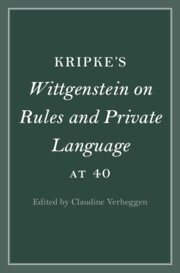Book contents
- Kripke’s Wittgenstein on Rules and Private Language at 40
- Cambridge Philosophical Anniversaries
- Kripke’s Wittgenstein on Rules and Private Language at 40
- Copyright page
- Dedication
- Contents
- Contributors
- Acknowledgments
- Introduction
- 1 Kripke’s Wittgenstein’s Skepticism about Rules and Meaning
- 2 Putting Wittgenstein Back into Kripkenstein:
- 3 Answering Kripke’s Skeptic
- 4 Wittgensteinean Notions of Uniformity and Kripkensteinean Skepticism
- 5 Wittgenstein’s Naturalism and the Skeptical Paradox
- 6 Kripke and Wittgenstein on Rules and Meaning
- 7 Semantic Normativity, Properly So Called
- 8 What Is the Skeptical Problem? Wittgenstein’s Response to Kripke
- 9 How Not to Brush Questions under the Rug
- 10 Quadders and Zombies
- 11 Communitarianism, Interpersonalism, and Individualism in Kripke’s “Skeptical Solution”
- 12 “Considered in Isolation”
- 13 The Meaning of Meaning Ascriptions
- Bibliography
- Index
1 - Kripke’s Wittgenstein’s Skepticism about Rules and Meaning
In Defense of the Standard Interpretation*
Published online by Cambridge University Press: 22 February 2024
- Kripke’s Wittgenstein on Rules and Private Language at 40
- Cambridge Philosophical Anniversaries
- Kripke’s Wittgenstein on Rules and Private Language at 40
- Copyright page
- Dedication
- Contents
- Contributors
- Acknowledgments
- Introduction
- 1 Kripke’s Wittgenstein’s Skepticism about Rules and Meaning
- 2 Putting Wittgenstein Back into Kripkenstein:
- 3 Answering Kripke’s Skeptic
- 4 Wittgensteinean Notions of Uniformity and Kripkensteinean Skepticism
- 5 Wittgenstein’s Naturalism and the Skeptical Paradox
- 6 Kripke and Wittgenstein on Rules and Meaning
- 7 Semantic Normativity, Properly So Called
- 8 What Is the Skeptical Problem? Wittgenstein’s Response to Kripke
- 9 How Not to Brush Questions under the Rug
- 10 Quadders and Zombies
- 11 Communitarianism, Interpersonalism, and Individualism in Kripke’s “Skeptical Solution”
- 12 “Considered in Isolation”
- 13 The Meaning of Meaning Ascriptions
- Bibliography
- Index
Summary
According to the “standard interpretation” of WRPL (favored by Wright, Boghossian, McGinn, and Goldfarb), the epistemological argumentation and metaphysical conclusion of the skeptic’s ruminations in Chapter 2 can be reconciled by viewing the overtly epistemological argumentation as merely a “dramatic device” for developing a fundamentally metaphysical argument. The epistemological challenge – to defend your claim that you know that you mean addition and your claim that you are justified in answering “5” – takes place under conditions in which you are granted ideal epistemological access to all of the sorts of facts capable of constituting your meaning addition by “+.” In this chapter, I will defend the standard interpretation against a recent attack launched by Hannah Ginsborg, and I’ll argue that the standard interpretation fits the text of Chapter 2 of WRPL more smoothly than Ginsborg’s alternative proposal. I’ll also make some comments on Ginsborg’s notion of “primitive normativity.”
Keywords
- Type
- Chapter
- Information
- Publisher: Cambridge University PressPrint publication year: 2024
- 1
- Cited by

